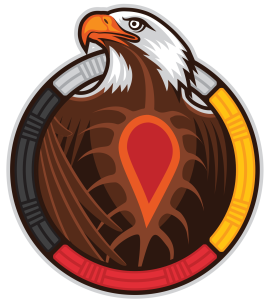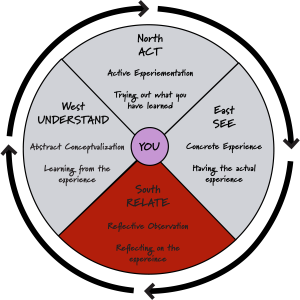
Through a series of videos featuring Nipissing First Nation staff and service provider perspectives in Connection 2, you will learn about how Wiidooktaadyang came to be and how this community driven approach moves service delivery away from colonial approaches.
THE SOUTH: RELATING VIDEOS TO EXPERIENCE
You will begin Connection 2 in the South where you will relate and reflect on your experiences by watching a series of videos describing how Wiidooktaadyang has moved service delivery from a colonial approach to a relational approach. You will conclude this section with a Reflection Checkpoint exercise to review the Seven Grandfather Teachings.

Frustration with Colonial Ways
Watch the following video to learn how Nipissing First Nation leaders’ frustration with colonial systems led to the development of Wiidooktaadyang.
In this video [6:27], NFN Elder, June Commanda speaks about her role as a Band Councillor learning about Nbisiing Debendaagziwaad and their struggles with siloed systems of care while NFN Strategic Advisor, Dwayne Nashkawa shares how these siloed systems were a legacy of colonial policies. A shared frustration with colonial systems and a required shift in thinking were the impetus of NFN’s Wiidooktaadyang program.
Video Transcript: Frustration with Colonial Ways [Doc] ![]()
Key Messages from the Video
- New and creative solutions were required by NFN leaders who listened intently to the complexities of community members’ needs
- Frustration from working within a colonial system of funding envelopes and siloes prompted a new model for solving problems and promoting thinking ‘in our own way’
Wiidooktaadyang Carries on the Ways of our Grandparents
Historically, Nbisiing Debendaagziwaad have always engaged in the caring practice of wiidooktaadyang whenever someone needed assistance (Peltier et al., 2022).
They helped one another by coming together to share resources such as food, labour, skills, and knowledge to ensure mino bimaadiziwin (a good life) for the community (Nipissing First Nation, 2017; Peltier et al., 2022).
It wasn’t monetary assistance in the form of government funding that made mino bimaadiziwin possible but instead sharing for the sake of the community (Peltier et al., 2022).
In this video [6:42], NFN Strategic Advisor, Dwayne Nashkawa, NFN Councillor and Elder, June Commanda, and NFN Psychologist, Dr. Brenda Restoule share and remember about the way of life that was grounded in looking after each other in times of need.
Video Transcript: Wiidooktaadyang Carries on the Ways of Our Grandparents [Doc]![]()
Key Messages from the Video
- Wiidooktaadyang grew out of a desire to reconstitute a natural way of life and helping each other that had been de-valued because of colonialism
- Traditionally, Nbisiing Debendaagziwaad would offer to help, in non-judgmental, caring ways, any person or family when they experienced a time of need
- Help came in the form of skills, innate gifts, or strengths that any person could offer
- The NFN Homemakers Club was an example of how grandmothers stepped forward to help in times of need
Remembering the Garden Village Picnics and Wiidooktaadyang as a Way of Life
This quote from a Nbisiing citizen speaks to wiidooktaadyang as a philosophy. This person remembers how the community came together at events to celebrate family and community connectedness. These Nbisiing community gatherings emphasized wellness as a reflection of belonging and sharing.
“You hear so much from our parents and grandparents about how big it was and it wasn’t all about making money. It was just there to bring everyone together and have a good time. Even seeing the old-time pictures of the beach there, it would be so cool to be part of and everyone coming together. Definitely something to strive for is just to [go] back to the old-time sitting around and listening to our grandparents just being together … we definitely still have community-wise relationships, it’s just not the same as before …” (Peltier et al., 2022).
Checkpoint 3: Reflect and Share an Experience
Recall a value that you learned from your parent(s), grandparent(s), caregiver(s), guardian(s), or loved one(s). Reflect on how you demonstrate that value in your work or life today.
Answer by either recording yourself speaking or by taking notes. Be sure to download a copy of your audio clip or notes before proceeding on.
Wiidooktaadyang Became a Way of Doing
In this video [1:56], NFN Strategic Advisor, Dwayne Nashkawa, speaks about Wiidooktaadyang as a multi-dimensional, creative way of problem solving at Nipissing First Nation.
Video Transcript: Wiidooktaadyang Became a Way of Doing [Doc]![]()
Key Messages from the Video
- NFN leadership challenged staff to solve problems in line with Nbisiing Nishnaabeg teachings
- Wiidooktaadyang promotes two-way engagement and prompts staff to use Nbisiing Nishnaabeg ways of thinking to solve problems and help people
- There is an emphasis on culture and language which enable you to think differently
Wiidooktaadyang is Based on NFN Values
“Culture has long been regarded as a critical component that has been lost through colonization and acts of assimilation against Indigenous people in Canada. In the last decade, program evaluations and research have identified that First Nation communities who have reclaimed Indigenous knowledge through language, cultural teachings and practices into their programs and services have demonstrated an overall improvement in individual, family, and community health.
Connection to culture and a strong cultural identity have also been identified as protective factors against mental health and social problems, addictions issues and even some physical health conditions. New research is suggesting that culture acts in ways to make people resilient, which gives them additional capacity and skills to effectively manage and deal with daily life stressors as well as more challenging problems like traumatic events in their lives. These scientific confirmations support what Indigenous knowledge keepers have said for some time – culture is critical to our overall health and wellness. With all of the knowledge of our elders and this supporting research, Nipissing First Nation has recognized that culture must be foundational to programs and services to ensure optimum health and wellness of its citizens” (Nipissing First Nation, 2017).
In the following video [4:48], NFN Councillor and Elder, June Commanda speaks about NFN values and non-judgmental caring that were seemingly lost then regained with Wiidooktaadyang. NFN Mental Health Therapist, Cheryl Shawana shares the importance of maintaining those values in Wiidooktaadyang today.
Video Transcript: Wiidooktaadyang is Based on NFN Values [Doc]![]()
Key Messages from the Video
- Values are the Grandfather Teachings, the way Nbisiing Debendaagziwaad lived and helped each other
- Demonstrating values of care, respect, and the spirit of community support happen naturally, and NFN continues to depend on them
- Though they may have fallen away over time, NFN had a strong desire to return to these values through Wiidooktaadyang
Living NFN Values Through Wiidooktaadyang
In the following video [5:57], NFN Psychologist, Dr. Brenda Restoule, NFN Mental Health Therapist, Cheryl Shawana, and NFN Family Well-Being Coordinator, Karen Auger share how Wiidooktaadyang lives NFN’s culture and values.
Video Transcript: Living NFN Values Through Wiidooktaadyang [Doc]![]()
Key Messages from the Video
- In the Wiidooktaadyang approach, there is intentional inclusion of family, even if the individual is not ready to receive skills, supports, or services in some cases
- NFN’s helping services includes the land-based activities both informal and more formal teaching where Nbisiing Nishnaabeg ways of being are included
- Wiidooktaadyang’s model of care builds on Nbisiing Nishnaabeg teachings, their creation story, and their roles as caretakers of the land and the lake
- Cultural supports are always available for ongoing wellness
Checkpoint 4: Reflective Journal Flashcards
Review each of the Seven Grandfather Teachings provided on the seven slides. For each Teaching, reflect on your own current or future practice and consider how you might demonstrate each. Using the space provided below, write a short reflective journal entry to share your reflection for each teaching.
When you have finished, you can click on the Download a copy of your journal entry button to create a document, then click Export to download a copy of your journal entry.
Connection 2 Summary
In Connection 2, we learned:
- Wiidooktaadyang means ‘we are helping one another’ and is the name for NFN’s community service integration model which bundles all relevant services to wrap around clients with multiple or complex needs
- Wiidooktaayang builds on community strengths and is based on NFN values outlined in the Seven Grandfather Teachings
- Wiidooktaadyang grew out of a desire to reconstitute this natural way of helping each other that had been de-valued because of colonialism. Nbisiing Debendaagziwaad would offer to help, in non-judgmental, and caring ways in times of need
- Wiidooktaadyang differs from other models because of the intentional inclusion of family, land-based activities, and cultural supports when clients want them

To move on to Connection 3, click on the “Next: Connection 3: Community Ownership, Collaboration and Self-Determination →” button at the bottom right hand corner of this page.
References
Nipissing First Nation. (2017, April). Wiidooktaadyang: We are helping one another: A holistic community services approach [Resource manual].
Peltier, C., Manankil-Rankin, L., McCullough, K., & McLeod-Shabogesic, L. (2022). Wellness and wiidooktaadyang: Moving Anishinaabe knowledge into action [Manuscript submitted for publication]. Faculty of Education and Professional Studies, Nipissing University.





